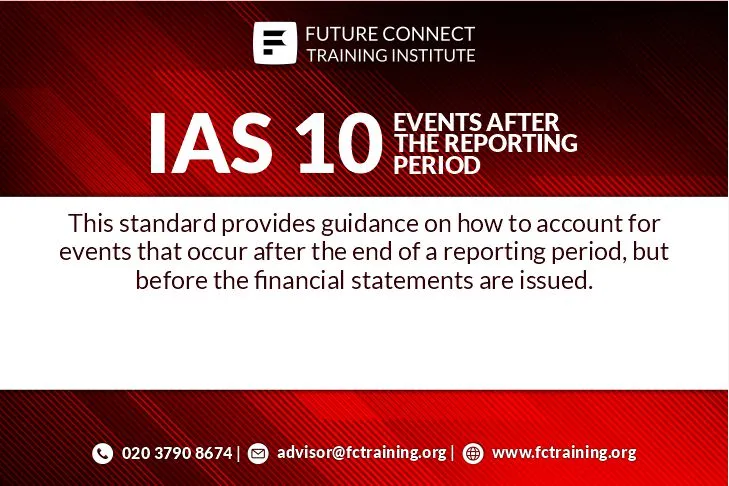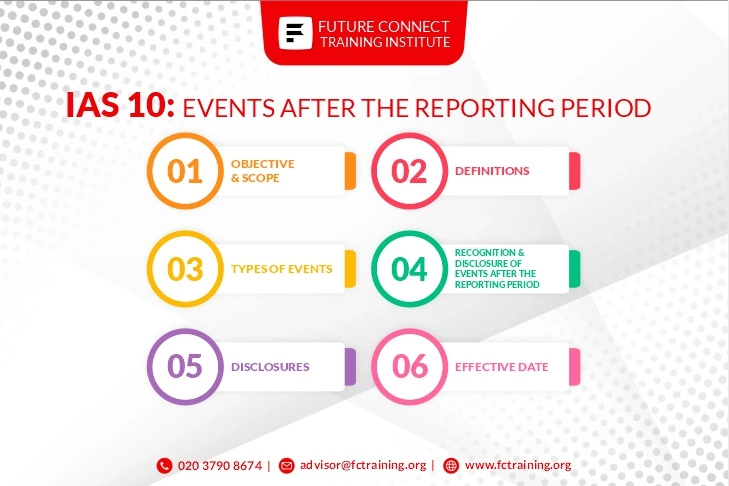
Introduction to IAS 10
International Accounting Standard 10 (IAS 10) is a financial reporting standard that specifies guidelines for the preparation and presentation of financial statements when events after the reporting period have occurred. IAS 10 ensures that entities disclose information about events that occurred after the end of the reporting period but before the financial statements were authorized for issue. The standard provides guidance on when such events should be recognized in the financial statements, how they should be disclosed, and how they affect the audit of the financial statements.
Scope of IAS 10
The scope of IAS 10 is limited to the recognition and disclosure of events occurring after the reporting period but before the financial statements are authorized for issue. The standard does not cover the accounting treatment of events occurring after the reporting period, nor does it provide guidance on the adjustments that may be required to the financial statements as a result of such events.
Recognition of Events After the Reporting Period
IAS 10 requires entities to recognize events after the reporting period if they provide additional evidence of conditions that existed at the end of the reporting period. Such events may include the settlement of a lawsuit that confirms a liability that existed at the end of the reporting period or the bankruptcy of a customer that confirms the impairment of a trade receivable that existed at the end of the reporting period.
IAS 10 also requires entities to recognize events after the reporting period if they indicate that conditions did not exist at the end of the reporting period. Such events may include the sale of an asset after the reporting period that indicates that the asset was not impaired at the end of the reporting period.
Disclosure of Events After the Reporting Period
IAS 10 requires entities to disclose the nature and the financial effect of events after the reporting period that are material to the financial statements. Materiality is determined by the entity's management, taking into consideration the quantitative and qualitative factors of the event.
IAS 10 requires entities to disclose the date when the financial statements were authorized for issue and who gave that authorization. If the financial statements have not been authorized for issue, entities should disclose that fact.
Auditing Considerations
IAS 10 requires auditors to obtain sufficient appropriate audit evidence regarding the events occurring after the reporting period. The auditor should evaluate the impact of such events on the financial statements and the disclosures provided by the entity.
The auditor should also evaluate whether the management has appropriately considered the events occurring after the reporting period in preparing the financial statements and whether the financial statements are consistent with the auditor's knowledge of the entity and the events occurring after the reporting period.

Conclusion
IAS 10 provides guidance on the recognition and disclosure of events occurring after the reporting period. The standard ensures that entities provide relevant information to users of the financial statements regarding events that occurred after the reporting period but before the financial statements were authorized for issue. The standard also provides guidance to auditors on how to evaluate the impact of such events on the financial statements and the disclosures provided by the entity.
FAQs
Frequently Asked Questions about IAS 10
International Accounting Standard 10 (IAS 10) is a financial reporting standard that provides guidelines for the preparation and presentation of financial statements when events after the reporting period have occurred.
The scope of IAS 10 is limited to the recognition and disclosure of events occurring after the reporting period but before the financial statements are authorized for issue.
Entities should recognize events after the reporting period if they provide additional evidence of conditions that existed at the end of the reporting period or indicate that conditions did not exist at the end of the reporting period.
Materiality is determined by the entity's management, taking into consideration the quantitative and qualitative factors of the event.
Auditors should obtain sufficient appropriate audit evidence regarding the events occurring after the reporting period and evaluate the impact of such events on the financial statements and the disclosures provided by the entity. The auditor should also evaluate whether the management has appropriately considered the events occurring after the reporting period in preparing the financial statements and whether the financial statements are consistent with the auditor's knowledge of the entity and the events occurring after the reporting period.
IAS 10 ensures that entities disclose information about events that occurred after the end of the reporting period but before the financial statements were authorized for issue. This provides relevant information to users of the financial statements and enhances the transparency and reliability of financial reporting.
How Future Connect Training's Final Accounts Training can help in understaing IAS 10?
- Future Connect Training's Final Accounts Training can be very helpful in understanding IAS 10 as it provides a comprehensive understanding of the preparation and presentation of financial statements. The training covers the fundamental principles of financial accounting, including the recognition and measurement of events after the reporting period, which is a key area covered by IAS 10.
- The training covers the preparation of final accounts, including balance sheets, income statements, and cash flow statements, which are essential components of financial reporting. The training provides a practical approach to financial accounting and includes real-world scenarios and case studies that help learners understand how to apply accounting principles in practice.
- Furthermore, the training covers the auditing of financial statements, which is a critical aspect of IAS 10. Auditing considerations for events occurring after the reporting period are covered in the training, which can help learners understand how auditors evaluate the impact of such events on the financial statements and the disclosures provided by the entity.
- Overall, the Final Accounts Training provided by Future Connect Training can be very helpful in understanding IAS 10 by providing learners with a practical understanding of financial accounting and auditing principles. It can help learners apply the principles covered in IAS 10 to real-world scenarios and prepare them to comply with the standard when preparing and presenting financial statements.




